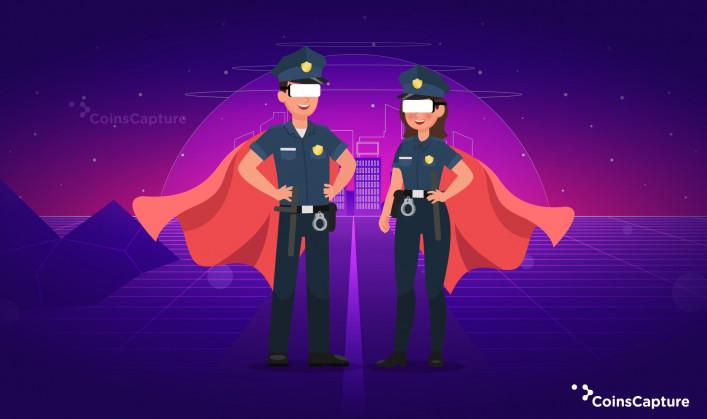7 November 2025
Interpol Police Force's Entrance in the Metaverse
There are always issues for the general public to deal with when a new technology is introduced, no matter how well-intended it may be. This has happened repeatedly throughout the history of the internet, Cryptocurrencies, and now NFTs. The misuse of such technology by criminals is a widespread issue. As the Metaverse gains popularity, law enforcement agencies like Interpol worry they may face an identical challenge and are making preparations to combat it. What we know at this time is detailed here.
Also Read: 5 Best Metaverse Trends In 2023
The Metaverse is not in the distant future; it is the present. The international police group held a surprise session to introduce the globe's earliest Metaverse created for law enforcement agencies throughout the globe. Interpol Metaverse is now fully functional, allowing authorized members to virtually visit the Interpol General Secretariat in Lyon, France, communicate with other officials through the use of their digital characters, and sometimes even consider taking interactive training classes in forensic analysis as well as other policing skills without leaving their homes or offices.
Also Read: Ethereum, Sandbox, And Rocketize Token Will Make You A Millionaire
Why is Interpol Joining the Metaverse?
From identification fraud to cyberbullying, law enforcement has always been behind technological developments in the face of digital crime. In most cases, fraudsters as well as malicious people have already left their mark on emerging technology even before they become widely used. In the Metaverse, nothing has changed. Even though the Metaverse is only getting started, there have been instances of sexual harassment and other crimes occurring on various platforms inside the Metaverse. The Metaverse, being both digital as well as fake, has the ability to become a crime haven if it is not effectively policed. The International Criminal Police Organization (Interpol) is expanding into the Metaverse in the event that crime becomes a major problem there.
Interpol Metaverse - Not Just For Gamers
The Metaverse is widely mentioned as the probable next step in the growth of the Internet, rather than just a gadget for gamers. Technology research company Gartner predicts that by 2026, one in four individuals would spend at least one hour each day in the Metaverse for purposes such as work, learning, shopping, and socializing. As the rate of digitization has grown, crime has shifted online, as shown by the recently issued Interpol Global Crime Trend report. The Metaverse is already being used by cybercriminals. Social manipulation schemes, violent extremism, and disinformation have been identified as potential threats by the World Economic Forum, which has worked with Interpol, Meta, Microsoft, and others in an effort to define and control the Metaverse. Atrocities against minors, data breaches, black money, fraudulent transactions, forgery, malware, hacking, as well as sexually harassment and assault are just some of the many that might be committed in the Metaverse as the number of people increases as well as the future technologies advance. A few of these dangers are especially problematic for law enforcement to deal with since not all actions that are illegal in the real world are also illegal in the cyber realm. By foreseeing these dangers at an early stage, we can collaborate with relevant parties to develop appropriate regulatory structures and shut down emerging black marketplaces. We can only formulate a suitable answer if we have these talks right now.
A Preemptive Solution
Interpol Metaverse is primarily focused towards recognizing and acting on such issues prior to them becoming big ones, according to an announcement by Interpol. Its goal is to assist law enforcement agencies in developing effective responses to this emerging danger. Interpol is seeking to employ its Metaverse capabilities to remotely educate its affiliates as well as other police agencies throughout the globe on policing in this dynamic and innovative virtual space. Furthermore, the technology would not really solely be utilized for training police groups about policing. As an added bonus, it might help Interpol integrate its real-world as well as cyber-policing efforts. Among the Interpol's aims is to guarantee they grow acquainted with the Metaverse enough to comprehend how criminality would function inside it should things begin adopting a malicious twist. For reasons of impartiality, the Interpol Metaverse does not make use of preexisting, largely privately owned Metaverse versions like those established by Meta and Microsoft. It is a primarily autonomous system, but boasting certain sort of cooperation with, and parallels to, various contemporary virtual world implementations.
Interpol Metaverse - New World and Commitment
The Metaverse has several potential uses for the police, including remote work, connectivity, proof collection as well as preservation, or education. Particularly promising is strength development in the Metaverse, which provides students with additional chances for collaboration and networking, guarantees a higher level of involvement via immersion, and makes it possible for pupils to participate in more practical learning tasks. Law enforcement must consider the vast consequences of how the Metaverse might affect their work. However, policing in the Metaverse requires first-hand experience.
Policing Without Borders
While the specifics of police operations in the Metaverse remain unclear, Interpol's proposed Metaverse adaption is an intriguing possibility. It's possible that atrocities like robbery, kidnapping, as well as fraud, which are becoming more hard to commit in the actual world, may migrate to the online realm. If this isn't addressed ahead of time, it might lead to complicated jurisdictional and border concerns for law enforcement. If the Metaverse suffers from the same issues of commercial sexual exploitation and sex that we have seen with technologies like Cryptocurrencies, or becomes a far safer version of the cyberspace wherein enforcement also isn't restricted by virtual boundaries, may depend largely on the level of readiness as a society.
Disclaimer: The author’s thoughts and comments are solely for educational reasons and informative purposes only. They do not represent financial, investment, or other advice.






